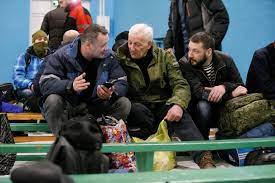Ukraine crisis disproportionately affecting older people
Source: HelpAge International
May 24, 2022
The ongoing conflict in eastern Ukraine between the Government and armed groups is disproportionately harming older people, especially older women and older people with disabilities, according to a new UN report. An estimated 30% of people (more than one million) affected by the conflict since 2014 are older people, many of whom have been driven from their homes by the violence along the contact line that divides Government and non-government-controlled areas in the Donetsk and Luhansk regions.
An estimated 3.5 million people need humanitarian assistance and protection. This number is continuing to rise due to the ongoing impact of the conflict on people’s mental health, restricted freedom of movement, widespread landmines, and a lack of access to food and basic services such as healthcare, housing, and pensions and other social benefits. Worsening security and the suspension of social benefits for hundreds of thousands of internally displaced people has meant the situation for older people continues to deteriorate.
Activities include the provision of community safe spaces for older people, targeted advocacy and coordination with NGOs, UN agencies and relevant authorities to ensure the inclusion of older people in the delivery of services, and psychosocial support. Peer-to-peer support groups have been established and home-based care activities, assistive devices, and hygiene kits have also been provided.
“We sometimes go without food. We spend most of our money on medical items. We haven’t enough money. That’s why we sometimes have nothing to eat,” said one older woman we spoke to.
Another said, when recalling being caught up in conflict: “I used to lie down. That’s all I could do. There were no medicines, no doctors, no pension, no food. I remember that time with horror. How did we survive? I don’t know.”
Conditions are deteriorating further with the onset of winter, and further restrictions on access to social entitlements and freedom of movement for people living in eastern Ukraine.
For those agencies still present in Ukraine, it is crucial that older people are included in assessments and can participate and benefit from humanitarian support and targeted services. Agencies need to cooperate to ensure appropriate aid reaches older people and those who depend on them, and the unique challenges faced by older people with disabilities are addressed. This could include increasing home visits and outreach services, as well as provision of mental health and psychosocial counselling and support services.
Increased and greater flexibility of funding are needed from humanitarian donors to meet urgent needs. The Government of Ukraine must ensure that all barriers to accessing pensions and other social entitlements, as well as public services, are speedily removed for older people caught up in the conflict.
For those who are required to cross the contact line to access pensions, healthcare or to visit family, crossing procedures need to be significantly improved to avoid older people having to queue for hours, often in bad weather without suitable facilities such as drinking water or toilets.
The full enjoyment of human rights by older people in Ukraine without discrimination is essential, regardless of the ongoing conflict. Humanitarian agencies and Government authorities must ensure that while this conflict continues, older people can access their human rights to protection and assistance in safety and with dignity.

